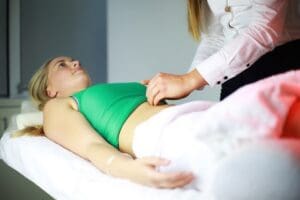Women’s Health with Acupuncture in East Asian Medicine
Manage Your Reproductive Health with Acupuncture
East Asian medicine has a long history when it comes to enhancing reproductive health and fertility for both men and women. In fact, evidence that acupuncture and herbal medicine have been used to aid fertility can be found in early medical literature dating back to 3 AD.
Statistics state that one in five couples over the age of 30 have difficulty conceiving after one year of trying. Many of these couples are turning to acupuncture and East Asian medicine for a safe, effective and natural solution to have a healthy baby.
Fertility treatments were first recorded by Zhang Zhong Jing, a famous physician from the Han Dynasty, in his discussion of diseases in women in the Jin Gui Yao Lue or Essentials of the Golden Cabinet.
According to the principles of East Asian medicine, a person’s health is determined by the quality of Qi, the vital life energy, and blood circulating through the body. When Qi and blood are circulating properly, the body is properly nourished and functioning optimally which, in turn, enhances fertility.
Researchers have confirmed the benefits of acupuncture and East Asian medicine for:
- regulating the menstrual cycle
- improving sperm count and motility
- reducing stress and anxiety associated with infertility
- normalizing hormone and endocrine systems
- improving blood flow in the uterus
- decreasing the chance of miscarriage
- increasing the chance of pregnancy for women undergoing in vitro fertilization (IVF)
Fertility treatment approaches can vary from person to person, but are usually scheduled for at least three consecutive cycles (twelve weeks). Treatments can include acupuncture, customized herbal therapy, stress reduction and dietary counseling.
If you or someone you know is experiencing difficulties with their reproductive health please call to see how acupuncture and East Asian medicine can help.
Premenstrual Syndrome (PMS)
Gynecological conditions including premenstrual syndrome (PMS), fibroids, endometriosis, menopause and infertility are some of the problems treated most successfully by acupuncture and East Asian medicine. East Asian medicine has long recognized that health and vitality can be sustained over a woman’s lifetime by restoring balance within the body and supporting the natural production of essential hormones.
Premenstrual Syndrome (PMS)
Premenstrual syndrome covers a broad spectrum that can include emotional symptoms such as depression, irritability, sadness, anxiety, or poor concentration and can also include physical symptoms, such as breast tenderness, a change in bowel habits, acne, or loss of libido. Symptoms can change from month to month and vary widely in terms of severity. Imbalances can arise from a variety of factors, including poor diet, too much work, physical or emotional trauma, constitutionally weak Qi (energy) or stress.
In East Asian medicine, the liver is considered responsible for the smooth flow of Qi (life force) throughout the body and for smoothing our emotions. When the liver’s function of moving Qi is disrupted, Qi can become stuck. This is referred to as Liver Qi Stagnation and is commonly associated with PMS. In addition to irritability and moodiness, signs and symptoms may include: distending pain in the area below the ribs, stuffiness of the chest, sighing, abdominal distention, nausea, sour regurgitation, belching, diarrhea or constipation, feeling of a lump in the throat, irregular periods, painful periods and distention of the breasts prior to periods.
If you or someone you know is struggling with symptoms associated with premenstrual syndrome call today to see how acupuncture can help!
Pregnancy & Childbirth
Pregnancy is an amazing time in a woman’s life. Many women report feeling healthier than they have ever felt before; however, the physical growth of the baby and changes in hormone levels can bring about pain, discomfort and a variety of health problems.
Acupuncture and East Asian medicine can provide a safe, effective alternative for many of the health complications that may arise before, during and after pregnancy. A growing number of women are choosing acupuncture to manage their health throughout their pregnancy and as an optional treatment for an overdue or difficult labor.
Planning for a Healthy Baby
Healthy parents produce healthy babies. With acupuncture and Oriental medicine, parents can improve their health to create the most optimal environment for their unborn child. In addition to their ability to strengthen, support, and balance overall health and well-being, acupuncture and Oriental medicine are effective treatments for regulating menstruation and hormone levels, reducing stress and addressing any pre-existing medical conditions or concerns.
Acupuncture during Pregnancy
Acupuncture and East Asian medicine can play a vital role in the comfort of a pregnant woman. There is strong evidence to support the belief that acupuncture is highly effective in treating some of the most common problems experienced during pregnancy.
Some of the problems that an acupuncturist often treats during pregnancy include:
- nausea, vomiting and morning sickness
- heartburn
- constipation
- edema and swelling
- pelvic pain
- neck and back pain
- sciatica
- leg cramps
- fatigue and exhaustion
- insomnia
- anxiety and depression
- water retention
Acupuncture for Childbirth
While there are acupuncture points that can provide natural pain relief during labor, acupuncture is more commonly used to induce labor. There are several points that stimulate contractions and influence cervical ripening. There is also an acupuncture point that has been found to turn a breech baby.
Postpartum Recovery
Many women feel depleted after the birth experience. Acupuncture and East Asian medicine can help smooth the transition during those first few months after birth to ensure a quick recovery.
Some postpartum disorders that can be treated with acupuncture:
- fatigue
- postpartum depression
- mastitis
- insufficient or excessive lactation
- post-operative healing
- night sweats
Postpartum care focuses on the physical, emotional and psychological recovery of the mother from the effects of pregnancy and labor, as well as encouraging breast feeding.
If you would like learn how acupuncture and East Asian medicine can facilitate your postpartum recovery, please call for more information

